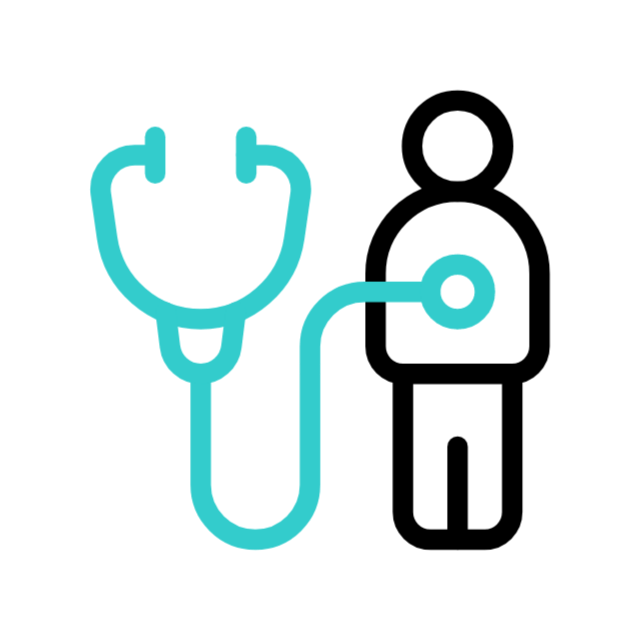Neurology

Epilepsy
Epilepsy is a brain illness that is enduring and associated with repeated, uncontrolled convulsions. A seizure is an abrupt and uncontrollable electrical imbalance in the brain which may result in alteration of behaviour, movements or light. Several causes may result in the condition, such as genetics, trauma to the head, infections, or brain tumours. Most people can address their seizures using medicine, but some of them may require additional treatment methods.
Indications of Epilepsy
- Recurrent seizures: The first sign is the presence of more than one nonconvulsive seizure, without an identifiable cause, due to conditions such as a fever or a lack of enough sugar in the blood.
- Abnormal Brain Activity: Brain activity is abnormal, and an electroencephalogram (EEG) with specific patterns of abnormal electrical brain activity is a primary diagnostic indicator.
- Refractory Epilepsy: Refractory epilepsy shows a patient not improving after the use of two or more anticonvulsant drugs, and the patient might need to be examined further on the possible surgical or other advanced measures.
Causes of Epilepsy
- Physical Consequences: The most immediate is the physical result of a seizure, which could be staring, a bit of catching, or an entire body tension. This may cause injuries, falls, and unconsciousness.
- Psychological and Social Impact: Epilepsy may also have a tremendous psychological and social burden that can cause anxiety, depression, and social isolation based on the fear of an epileptic attack in the street.
- Cognitive Impairment: In rare instances, memory impairment and inability to concentrate and other mental challenges could arise due to frequent seizures or uncontrolled seizures.
Alzheimer's disease
Alzheimer's disease is a progressive neurodegenerative condition, which is the highest contributor to dementia. It is marked by a progressive deterioration of memory, thinking, and reasoning ability to the extent that it disturbs day-to-day life. The abnormal place and tangles of proteins accumulated in the brain cause the disease, destroying neurons and causing brain tissue contraction. Although the disease mainly occurs in older adults, it is not a sign of getting old.
Signs of Alzheimer's Disease
- Memory Loss: Memory loss is the most common early symptom, and it changes the performance of life, especially forgetting what was learned. This may involve repeating queries, using memory aids or forgetting important events and dates.
- Trouble with Planning and Problem-Solving: People may get stuck planning, with arithmetic, or getting their attention on a task. They can greatly slow down in carrying out tasks they did effortlessly before.
- Losing track of Time and Place: Patients with Alzheimer's can forget time and season, forget how time passes. They can lose their memory of where they are and how they ended up there.
Effects of Alzheimer's Disease
- Cognitive Decline: The first is the gradual loss of mental abilities, where people experience significant difficulty remembering things, losing judgment, and losing their ability to communicate and think.
- Behavioural and Personality Alterations: As the disease progresses, people are likely to undergo severe personality and behavioural alterations, such as mood swings, agitation, suspicion and withdrawal.
- Loss of Independence: Eventually, there is a total loss of independence because of Alzheimer's disease. Patients ultimately need to be under full-time care even when carrying out the most fundamental activities of daily life, including eating, dressing, and bathing.
Peripheral nerve disorder
Alzheimer's disease is a progressive neurodegenerative condition, which is the highest contributor to dementia. It is marked by a progressive deterioration of memory, thinking, and reasoning ability to the extent that it disturbs day-to-day life. The abnormal place and tangles of proteins accumulated in the brain cause the disease, destroying neurons and causing brain tissue contraction. Although the disease mainly occurs in older adults, it is not a sign of getting old.
Signs of Alzheimer's Disease
- Memory Loss: Memory loss is the most common early symptom, and it changes the performance of life, especially forgetting what was learned. This may involve repeating queries, using memory aids or forgetting important events and dates.
- Trouble with Planning and Problem-Solving: People may get stuck planning, with arithmetic, or getting their attention on a task. They can greatly slow down in carrying out tasks they did effortlessly before.
- Losing track of Time and Place: Patients with Alzheimer's can forget time and season, forget how time passes. They can lose their memory of where they are and how they ended up there.
Effects of Alzheimer's Disease
- Cognitive Decline: The first is the gradual loss of mental abilities, where people experience significant difficulty remembering things, losing judgment, and losing their ability to communicate and think.
- Behavioural and Personality Alterations: As the disease progresses, people are likely to undergo severe personality and behavioural alterations, such as mood swings, agitation, suspicion and withdrawal.
- Loss of Independence: Eventually, there is a total loss of independence because of Alzheimer's disease. Patients ultimately need to be under full-time care even when carrying out the most fundamental activities of daily life, including eating, dressing, and bathing.
ALS
ALS, or amyotrophic lateral sclerosis, is a progressive, rare neurodegenerative disease that damages nerve cells within the brain and the spinal cord. These are nerve cells referred to as the motor neurons, which control the movement of voluntary muscles. With ALS, these motor neurons die, and subsequently, muscles grow weaker and waste away. This causes the loss of the ability to initiate and affect all voluntary movement, such as walking, speaking, swallowing and breathing.
Indications of ALS
- Progressive Muscle Weakness: An undeniable sign is the progressive general weakness, which may begin in the extremities, causing one to be unable to walk correctly or may start by tripping, or dropping items.
- Achiness and twitching: Some early symptoms of the condition are achiness and twitching of the arms, legs, shoulders, or tongue, as well as muscle cramps.
- Speech and Swallowing Difficulty: The disease may interfere with the bulbar muscles, leading to incomplete speaking due to difficulty in speech dysarthria and difficulty swallowing (Dysphagia) as it progresses.
Consequences of ALS
- Inability of Motor Function: The most devastating is the progressive loss of voluntary muscle control. Patients ultimately become immovable and end up being paralysed.
- Respiratory Failure: Since the disease harms the diaphragm muscles and chest wall muscles, patients fail to breathe independently and are on a mechanical ventilator. This is what usually causes death.
- No Cognitive Impairment: It is necessary to add that in most individuals with ALS, the disease does not affect their cognitive functions, memory or personality. They will be aware and clear during the disease progression.
Brain injuries
Traumatic brain injury (TBI), which is commonly referred to as a brain injury, is an injury to the brain caused by a severe shock or a blow to the head. This leads to the brain losing its normalcy and may have short and long-lasting physical, mental and psychological implications. A TBI can be mild (like a short concussion) to severe (an extended unconsciousness or amnesia disorder). Timely diagnosis and treatment play an essential role in limiting the extent of the malady and maximising a patient's recovery.
Signs of Brain Injuries
- Loss of Consciousness or Altered Mental Status: The first indicator of a TBI is a state of unconsciousness or confusion or being in some sort of dazed condition following head injury.
- Neurological Symptoms: Emergence of new symptoms such as poor balance, slurred speech, impairment of vision, or severe, dizzy headaches may indicate brain damage.
- Post-Traumatic Amnesia: Loss of the memory of events just before or after injury is typical and significant in delivering awareness of brain damage.
Impact of Brain Damages
- Cognitive and Psychological Impairments: TBI may result in cognitive defects such as memory, attention, and problem-solving issues, mood swings, depression, or anxiety.
- Physical Disabilities: Such a person can develop physical disabilities like muscle weakness, incoordination or trouble in speech and swallowing, depending on the part of the brain that is impacted.
- Long-Term Complications: TBIs that cause severe injuries may render a person permanently disabled and may require long-term rehab. They also pose the threat of developing neurodegenerative disorders in the future, such as Parkinson's or dementia.
Removal of the tumour
Surgery to remove the tumour is a frequently needed and frequently life-saving component of cancer treatment. A surgeon accesses the tumour and some margin of healthier tissue to eliminate cancer cells. The procedure is done on benign (non-cancerous) and malignant (cancerous) tumours. Although the main aim of treatment is to cure the patients and eliminate the disease, it may also be employed to alleviate symptoms and prevent the spread of the cancer.
Signs of Removal of the Tumour
- To Eradicate Cancer: Surgery, in most cases, is the best way to treat solid tumours that have not yet spread (metastasised). Surgeons can ensure the optimal possibility of a long-term remedy for numerous cancers by removing the entire tumour.
- Diagnosis and staging: To establish a cancer diagnosis and be able to define which cancer and what stage it is, it is vital to take a biopsy, or surgical excision of a minor amount of tissue. This data informs all further treatment decisions.
- Palliative Care: Surgery can also be applied to alleviate symptoms even when a tumour is incurable or upon the spread of the cancer. For example, a surgeon can remove a tumour that causes pain or occludes a vital organ, leading to a better quality of life for the patient.
Effects of Tumour Removal
- Reduction or Elimination of Tumours: The most dramatic of the effects is whether the cure can be achieved. In cases where curing is impossible, the surgery may debulk the tumour, making newer kinds of treatment like chemotherapy or radiation work.
- Side Effects and Complications: Such patients can get various forms of side effects, such as pain, infection, bleeding, and scarring. The exact effects vary according to the site and size of a surgery.
- Better Prognosis: Surgery can have a massive positive impact in giving a patient a better chance to survive and a lower likelihood of cancer recurring as the tumour is removed.


 Insurance
Insurance Health Packages
Health Packages

